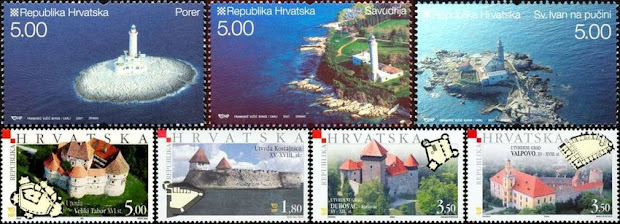The Croatian alphabet has a number of diacritic marks that modify the pronunciation of a letter. Or better: a letter with a diacritic mark is a separate letter by itself. The letters are often transcribed in translations, so that the word četnik becomes chetnik, ustaša ustasha, Jelačić Jellachich (in older books), and so on. The Jelačić-Jellachich case shows the problem of transliteration. There is no combination of English letters that can express the difference between ć and č. It's fair to say that the difference is small, and that many young Croats frequently mix them up. Serbs swear there is an audible difference between ć and č, but Croats are more relaxed about it. Other such letters are š, đ and ž. One of my favorite words is učvršćenje. Words without diacritic marks can be difficult to pronounce too, as strpljiv shows.
 Computers and SMS servers cannot always deal with these letters. If you send an SMS containing the word šunka your mobile will convert it into shunka and proceed the message to the server. The server sends it to the recipient's phone, which in turn converts shunka to šunka. Anyone who can count sees that shunka has one letter more than šunka. And that is the heart of the matter. One SMS can contain 160 characters. So, if you have used up all your characters for one SMS and click send, you will pay for two text messages. Transliteration makes words longer, so you can cross the 160 character limit without knowing it.
Computers and SMS servers cannot always deal with these letters. If you send an SMS containing the word šunka your mobile will convert it into shunka and proceed the message to the server. The server sends it to the recipient's phone, which in turn converts shunka to šunka. Anyone who can count sees that shunka has one letter more than šunka. And that is the heart of the matter. One SMS can contain 160 characters. So, if you have used up all your characters for one SMS and click send, you will pay for two text messages. Transliteration makes words longer, so you can cross the 160 character limit without knowing it.
I searched a bit in Wikipedia and learned that many more languages use letters with diacritic marks. Sending text messages in Czech should be very expensive, as that language has the following letters: á é í ó ú ý č ď ě ň ř š ť ž ů.
As a matter of fact, not many Croats use diacritic marks in text messages. They simply write sunka or, if they are purists, shunka. Teletext doesn't use diacritic marks either, although I don't quite understand why. Maybe teletext is considered so twentieth century that no one cares.
Serbs also transliterate (or: phoneticize) the other way around, a very annoying habit if I may say so and confusing at first sight. Who the hell are Vilijam Batler Jejts, Džordž Bernard Šo and Vinston Čerčil? Hint: all won the Nobel prize in Literature.
 Computers and SMS servers cannot always deal with these letters. If you send an SMS containing the word šunka your mobile will convert it into shunka and proceed the message to the server. The server sends it to the recipient's phone, which in turn converts shunka to šunka. Anyone who can count sees that shunka has one letter more than šunka. And that is the heart of the matter. One SMS can contain 160 characters. So, if you have used up all your characters for one SMS and click send, you will pay for two text messages. Transliteration makes words longer, so you can cross the 160 character limit without knowing it.
Computers and SMS servers cannot always deal with these letters. If you send an SMS containing the word šunka your mobile will convert it into shunka and proceed the message to the server. The server sends it to the recipient's phone, which in turn converts shunka to šunka. Anyone who can count sees that shunka has one letter more than šunka. And that is the heart of the matter. One SMS can contain 160 characters. So, if you have used up all your characters for one SMS and click send, you will pay for two text messages. Transliteration makes words longer, so you can cross the 160 character limit without knowing it.I searched a bit in Wikipedia and learned that many more languages use letters with diacritic marks. Sending text messages in Czech should be very expensive, as that language has the following letters: á é í ó ú ý č ď ě ň ř š ť ž ů.
As a matter of fact, not many Croats use diacritic marks in text messages. They simply write sunka or, if they are purists, shunka. Teletext doesn't use diacritic marks either, although I don't quite understand why. Maybe teletext is considered so twentieth century that no one cares.
Serbs also transliterate (or: phoneticize) the other way around, a very annoying habit if I may say so and confusing at first sight. Who the hell are Vilijam Batler Jejts, Džordž Bernard Šo and Vinston Čerčil? Hint: all won the Nobel prize in Literature.





0 reacties:
Post a Comment